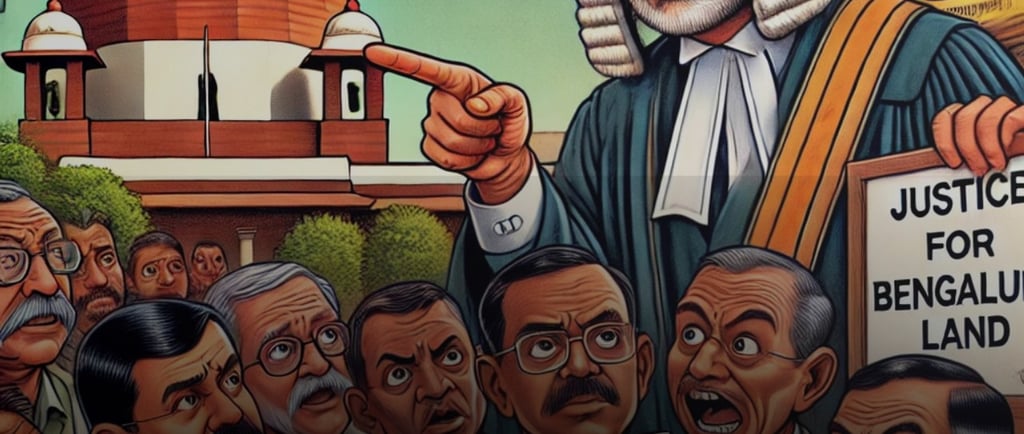Supreme Court Issues Final Ultimatum to Karnataka Government Over TDR Compliance
Supreme Court of India has reprimanded the Karnataka government for its failure to comply with long-standing orders to issue Transferable Development Rights (TDR) to landowners affected by the widening of Bengaluru's Bellary and Jayamahal roads. The Court has granted the authorities six weeks to fulfill their obligations, warning of severe consequences for further non-compliance.
12/12/20243 min read


Supreme Court of India has reprimanded the Karnataka government for its failure to comply with long-standing orders to issue Transferable Development Rights (TDR) to landowners affected by the widening of Bengaluru's Bellary and Jayamahal roads. The Court has granted the authorities six weeks to fulfill their obligations, warning of severe consequences for further non-compliance.
The case, rooted in a 1996 state law—the Bangalore Palace (Acquisition and Transfer) Act—has witnessed protracted litigation spanning over two decades. At the core of the dispute is 15 acres of land acquired from the erstwhile Maharaja of Mysore’s heirs for public infrastructure projects. The Supreme Court's 2014 and 2022 orders explicitly mandated the issuance of TDR certificates to compensate landowners as per Karnataka's Town and Country Planning rules, but compliance has remained elusive.
Chronology of Events
The initial Supreme Court ruling in 2014 allowed the Karnataka government to proceed with the road-widening project, provided TDR certificates were issued to affected landowners. However, despite the Court’s directives, the state delayed implementation, citing financial constraints. This led to a string of contempt petitions by the affected parties, including the legal heirs of the Maharaja, who accused the state of willful disobedience.
In May 2022, the Court rejected the Karnataka government’s plea to modify the 2014 order and reiterated the mandate for TDR issuance. Nevertheless, bureaucratic inertia persisted. Landowners alleged that the state's actions, including undervaluation of their land, were attempts to dilute their rightful compensation.
Supreme Court’s Observations
Delivering the judgment, Justice Aravind Kumar criticized the Karnataka government and its agencies, including the Bengaluru Development Authority (BDA) and Bruhat Bengaluru Mahanagara Palike (BBMP), for deliberate non-compliance. The Court noted that attempts to undervalue the land—pegging its price significantly below market rates—constituted a breach of its orders. It dismissed the state’s financial hardship argument, emphasizing that legal obligations must be honored regardless of fiscal challenges.
The Court also rejected the government’s claim that the land’s valuation should align with agricultural standards. Highlighting evidence from official documents, the judgment underscored that the land was located in a prime urban area and should be compensated as per guidance values set under the Karnataka Stamp Act.
Controversial Delay Tactics
The Supreme Court was particularly critical of the state’s "deliberate and intentional" delay tactics. From 2014 to 2019, no substantive steps were taken to issue the TDR certificates. Even after a government order in July 2019 permitting TDR issuance, compliance was stalled, with authorities citing various procedural hurdles. This led to contempt petitions filed in 2021, reigniting the legal battle.
In 2021, the Karnataka government attempted to modify the original Supreme Court order, seeking permission to pay compensation instead of issuing TDR. This plea was also dismissed, further solidifying the Court’s stance on the matter. However, non-compliance persisted, prompting another round of contempt proceedings.
Final Warning and Compliance Deadline
In its December 2024 ruling, the Supreme Court issued a final ultimatum. The bench directed the government to issue TDR certificates based on market rates specified under the Karnataka Stamp Act—Rs. 2,83,500 per square meter for Bellary Road and Rs. 2,04,000 per square meter for Jayamahal Road. The Court clarified that the TDR certificates’ validity would hinge on the outcome of pending civil appeals concerning the acquisition of the larger 456-acre Bangalore Palace property.
Justice Kumar’s ruling emphasized that non-compliance undermines the judiciary’s authority and erodes public trust. The judgment cited prior cases to reiterate that financial constraints cannot justify the failure to honor judicial directives.
Implications for Governance
This ruling sends a stern message to state governments regarding the sanctity of judicial orders. It highlights the need for timely execution of court mandates to prevent prolonged litigation and erosion of public trust. Legal experts believe this judgment could set a precedent for similar cases involving delayed compensations and bureaucratic negligence.
For the affected landowners, this decision represents a significant victory after years of legal struggle. However, they remain cautious, awaiting the actual issuance of TDR certificates within the stipulated six-week period. Failure to meet this deadline could invite further legal consequences for the Karnataka government, including personal penalties for officials responsible.
Conclusion
As the six-week compliance deadline looms, all eyes are on the Karnataka government and its agencies. The Supreme Court’s firm stance underscores the judiciary’s commitment to upholding citizens' rights and ensuring accountability in governance. Whether this marks the end of the protracted legal battle or another chapter in the saga remains to be seen.
